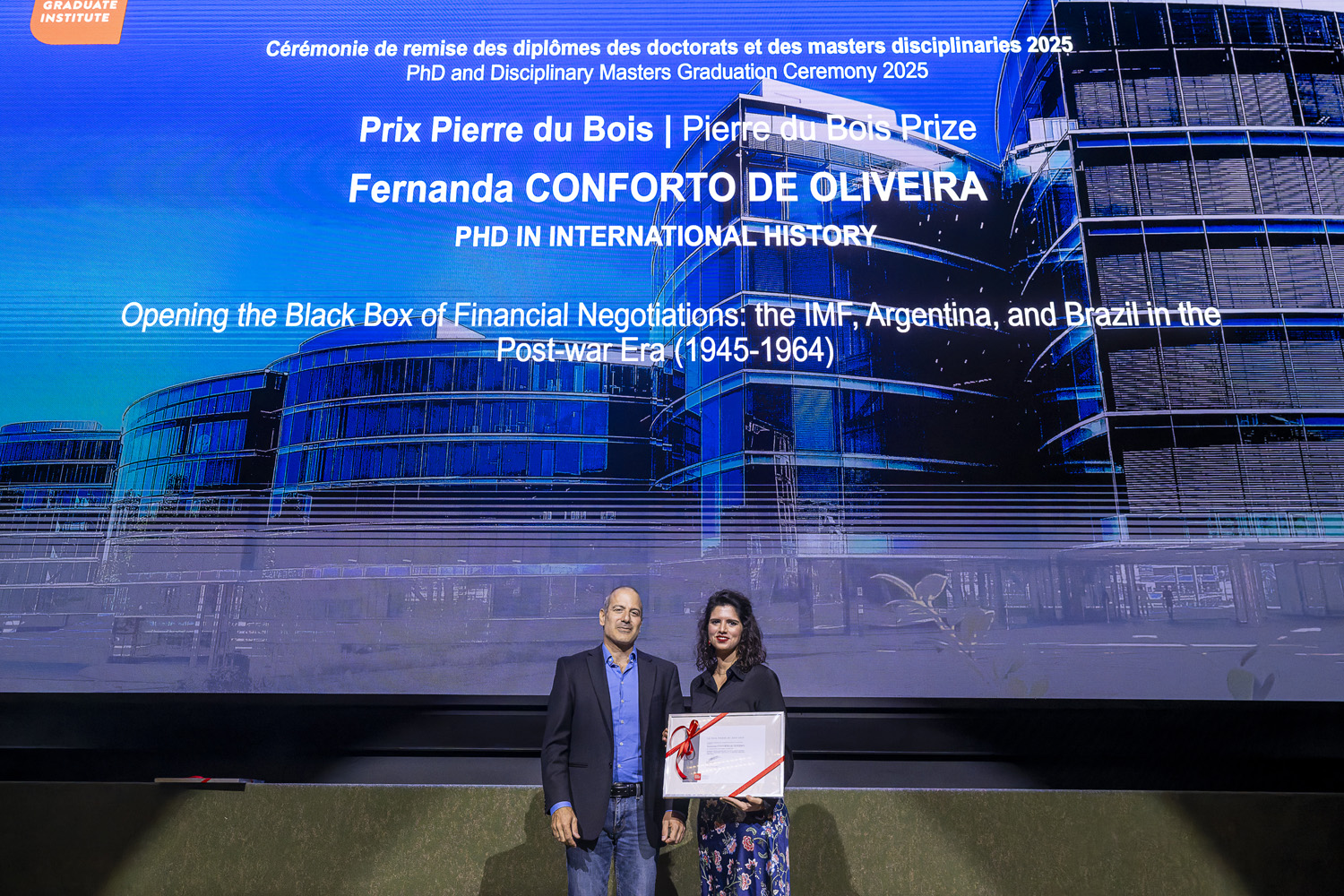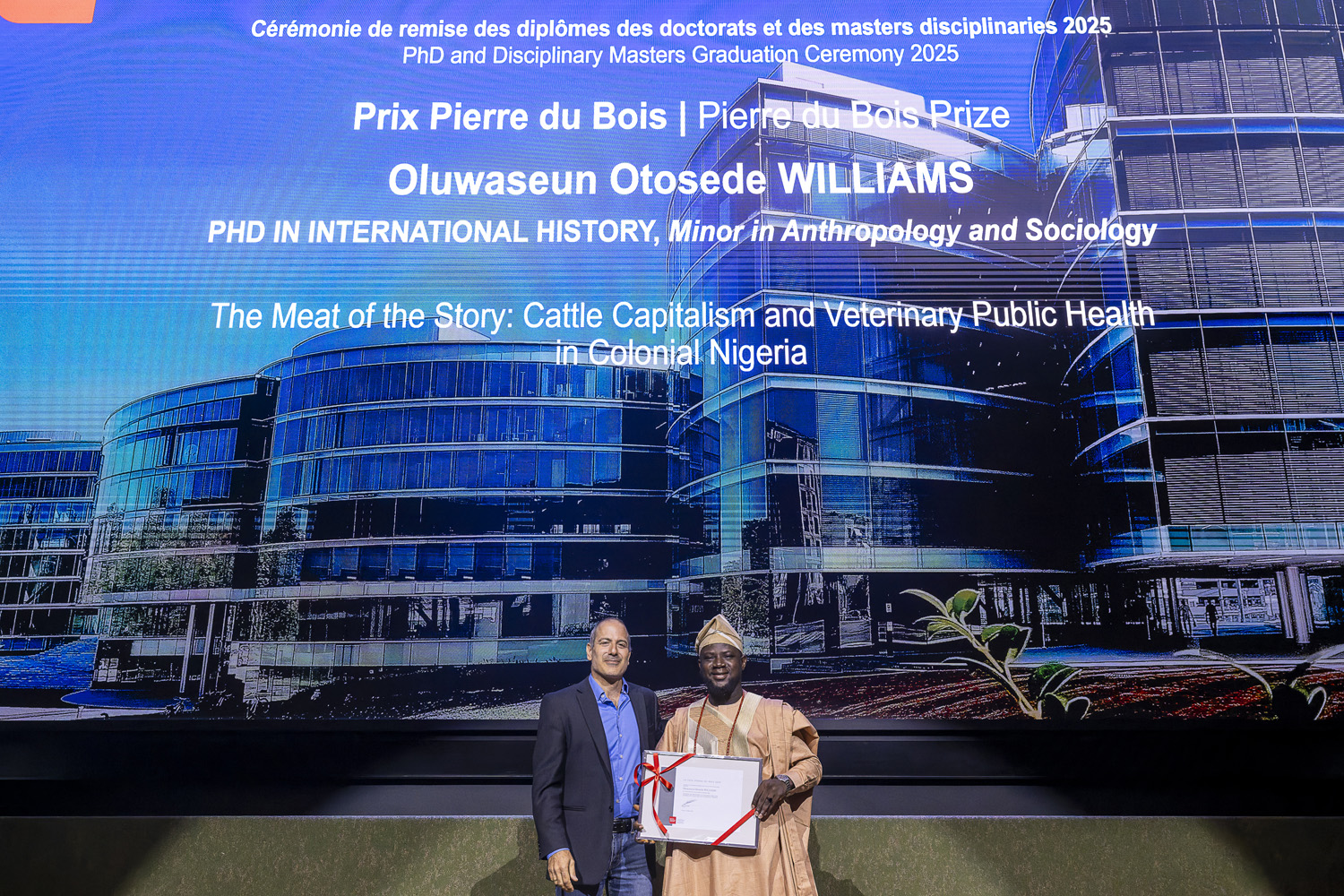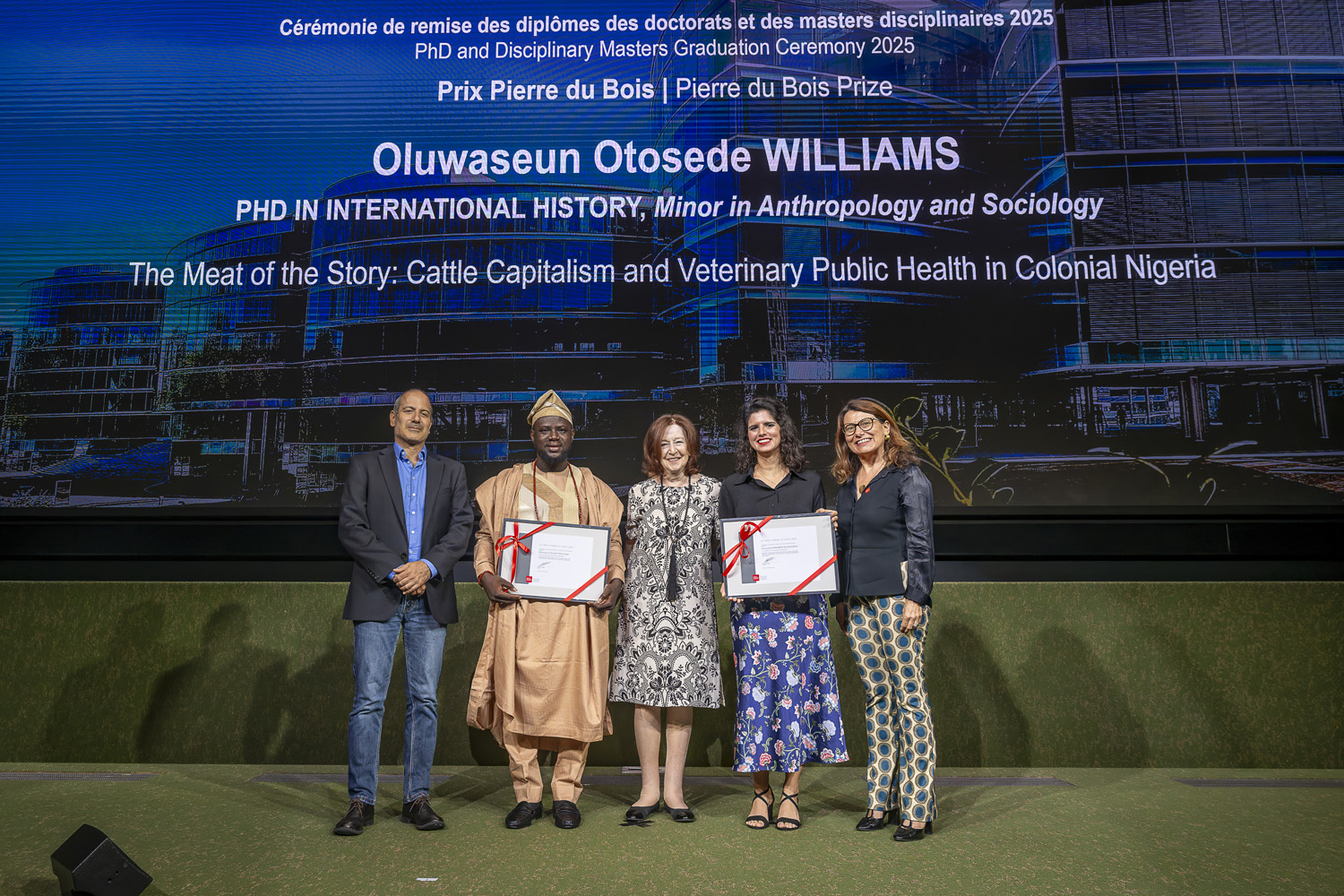The recipients of the Pierre du Bois Prize in 2025, awarded annually for the best doctoral thesis in International History and Politics defended at the Geneva Graduate Institute, are, ex aequo, Dr Fernanda Conforto de Oliveira and Dr Oluwaṣeun Otọsedẹ Williams.
Dr Fernanda Conforto de Oliveira
Fernanda received the prize for her thesis Opening the Black Box of Financial Negotiations: The IMF, Argentina, and Brazil in the Postwar Era (1945–64) which offers the first comparative historical analysis of the International Monetary Fund’s early engagement in South America by addressing a key puzzle: why did Argentina secure the IMF’s financial support through multiple arrangements in the 1950s and early 1960s while Brazil, despite similar economic and political conditions, did not? Existing scholarship on IMF lending, whether through broad panel datasets or individual country case studies, has yet to fully explain this divergence, in part because it cannot account for such different outcomes based on observables. Fernanda’s scholarship posits that beyond conventional macroeconomic, political, and geopolitical factors, policymakers’ “sentiment” played a critical role in determining IMF support for Argentina and Brazil. For the IMF, sentiment meant confidence that national authorities were both willing and able to implement the agreed-upon reforms. For country officials, it reflected their trust in the IMF as a reliable partner during the adjustment process. These mutual perceptions of trust, credibility, and political and economic capacity constitute forms of “soft information” that are not directly visible to the researcher. Fernanda thus fine-tuned artificial intelligence algorithms to transform qualitative statements from recently declassified, confidential policy sources – from the IMF as well as the US, Argentine, and Brazilian governments – into quantifiable sentiment indices. Her analysis shows that these indices are highly significant, both economically and statistically, in explaining whether and when each country received IMF financial support in this period.
Currently, Fernanda is a Senior Researcher at the University of Lausanne on the SNF project A Matter of Life and Debt: The Lost Decade and the Rise of Neoliberalism in Latin America, 1982-1994, where she continues to refine her methodology to analyse how policymakers’ perceptions influenced international decision-making during one of Latin America’s most turbulent periods: the “lost decade” and the rise of neoliberalism in the 1980s and 1990s.
Fernanda is extremely grateful for the wavering support of her supervisors, Professors Rui Esteves and Nathan Sussman.
Links:
PhD research project: https://www.graduateinstitute.ch/centres/centre-finance-and-development/opening-black-box-financial-negotiations-imf-argentina-and
Current SNF project: https://data.snf.ch/grants/grant/218226
Personal website: https://fernanda-deoliveira.com/
LinkedIn: https://ch.linkedin.com/in/fernanda-conforto-de-oliveira-1383a9a0
Dr Oluwaseun Otosede Williams
Oluwaṣeun received the prize for his doctoral thesis The Meat of the Story: Veterinary Public Health and Cattle Capitalism in Colonial Nigeria which historicises colonial veterinary and nutrition sciences in British Nigeria vis-à-vis the imperial exploitation of the region’s cattle economy from 1860 to 1960. Bringing together social histories of veterinary medicine, food systems, pastoral economies, human–animal relations, and of colonial Nigeria, the work interrogates the place of the cow—migrant, fattened, diseased, dying, or dead—in the colonial economy and transimperial politics. The dissertation finds that colonial nutrition and veterinary sciences were political and capitalist sciences mobilised for the imperial control and exploitation of the pastoral economy and food systems of colonial Nigeria and the Central Sudan. The study centres diverse actors—nonhuman and human—as well as multiple epistemes and expertise—expatriate and indigenous—that were involved in the various colonial public health schemes.
The co-supervisors of the dissertation were Associate Professor Aidan Russell of the International History and Politics Department, and Professor Vinh-Kim Nguyen of the Anthropology and Sociology Department both at the Geneva Graduate Institute.
To know more about our recipient, please find below a copy of an Interview conducted by Nathalie Tanner of the Graduate Institute Research Office with Ṣeun Williams:
Why did you choose to study the history of veterinary and nutrition sciences in colonial Nigeria?
The choice stems from various encounters I had while pursuing my undergraduate studies at the University of Lagos, Nigeria (UNILAG) from 2009 to 2013. During those years, I frequently commuted between my hometown of Badagry and the university campus in Akoka, Yaba at the heart of the city. In the course of those journeys, I would pass by a particular slaughter-slab that permanently emitted a pungent smell of fresh blood, raw flesh, and animal waste. Furthermore, at a point during my sophomore year, I had to put up with a friend whose one-storey apartment overlooked the public abattoir in Bariga community, close to UNILAG. For the few weeks I spent there, I was awakened every morning by the abattoir’s strong smell, sound and sight. These routine experiences left an indelible mark on my mind, sparking my curiosity about the long history of public abattoirs and meat markets in Lagos, as well as the connection between meat production and veterinary public health in the city. My doctoral research proposal was initially based on this subject, but my extensive research in multiple archives across Nigeria and the United Kingdom led me to expand the scope of the study both spatially and thematically.
Can you describe your thesis questions?
The thesis critically addresses the following questions: What was the place of the livestock sector in Nigeria’s colonial economy? How did colonial public health systems bear on food cultures — particularly cattle production, and meat production and consumption — in colonial Nigeria? How were notions of “good”, “safe” and/or “healthy” food/animal shaped and reshaped throughout the era of British colonisation of Nigeria? How did colonial veterinary science and indigenous health systems impact each other in twentieth-century Nigeria? What significance did colonial public health have for human–animal relations and inter-imperial affairs in Nigeria and the Central Sudan region? What roles did various actors — nonhuman and human, expatriate and local — play in the cause of nutritional and veterinary public health in colonial Nigeria?
What methodology did you use to address all these questions?
Methodologically, the study relies heavily on troves of colonial documents, official correspondences, annual reports and other occasional publications, newspapers and other materials held at various archives in different parts of the world. I trailed the faint hoof-prints and moos of the Nigerian cattle into the three arms of the National Archives of Nigeria (viz. Ibadan, Kaduna and Enugu); the National Archives of the United Kingdom in London; the repository of the Nigerian National Veterinary Research Institute, Vom, Jos; the British Empire and Commonwealth Collection’s Oral History Archive held at Bristol Archives in the UK; as well as Unilever Archives at Port Sunlight in the UK. I equally consulted online repositories such as the British Online Archives, Wellcome Collection, Center for Research Libraries, and Internet Archive. I excavated previously neglected records and amplified marginalised historical actors and narratives, reading the archives both along and against the grain.
In constructing this multispecies story, I took the colonial veterinary and nutritional laboratories, the quarantine and immunisation camps, the abattoirs and slaughter-slabs, as well as the cattle and meat markets to be important sites of history and contact zones within which human, animal, plant and microbial agents met and interacted in various ways.
What are your major findings?
My thesis makes three important contributions to the global historiographies of medicine and public health, livestock economies, pastoral ecologies, and colonial capitalism. First, it pushes the scope of the historical scholarship on health and medicine in Nigeria and West Africa by underscoring the inherently multispecies character of public health. In other words, the study foregrounds the interconnectedness of various aspects of human, animal and environmental health. The thesis centres nonhuman beings as veritable colonial subjects and historical agents that play indispensable roles in world-making. Beyond being the first study on veterinary public health history in British West Africa, the thesis establishes that livestock health, and by extension, pasture and environmental health, were as critical for the colonial state as was human well-being.
Secondly, the study contributes to knowledge production on colonial capitalism and commodity history by unravelling the socio-economic processes that made for the intensive commercialisation of cattle and other livestock (what I called “cattle capitalism”), as well as the mainstreaming of meat eating (which I termed “meatification”) in the Nigerian area. Fundamentally, I argue that colonial veterinary and nutrition sciences were political and capitalist sciences mobilised for the imperial control and material exploitation of the livestock economy and living systems of the Central Sudan.
Thirdly, the dissertation centres non-Western knowledge systems and disease management practices. It underscores the stock-breeding and ethnoveterinary expertise of the indigenous Fulani pastoralists, as well as the contributions of African colonial personnel and colonial nonhumans alongside those of European expatriates in promoting veterinary public health in nineteenth- and twentieth-century Nigeria. Whereas many of the laboratory vaccines developed by the colonial veterinary department proved to be very effective for arresting epizootic diseases like rinderpest, blackquarter and anthrax, there were remarkable episodes, such as during a campaign against contagious bovine pleuropneumonia, where colonial interventions failed woefully while indigenous (or vernacular) science continued to achieve appreciable results.
What could be the socio-political implications of your thesis?
I hope that my thesis will inspire well-intentioned public authorities, corporate establishments, private investors and agricultural scientists to further explore the viability of ranch-based stock-breeding and meat production on a large scale across Southern Nigeria beyond what was accomplished during the colonial and immediate postcolonial eras. In the face of tsetse fly endemicity across the region, this may entail investigations involving trypano-resistant or trypano-tolerant cattle breeds as well as tsetse eradication programmes, and would require strong political will on the part of the critical stakeholders. Similar initiatives are imperative in Northern Nigeria as well, but those would necessitate different approaches. Developing sustainable commercial stock production and meat industries across Nigeria would go a long way in mitigating the long-running armed violence and wanton carnage that continues to plague the cattle economy of Nigeria and the Central Sudan region.



